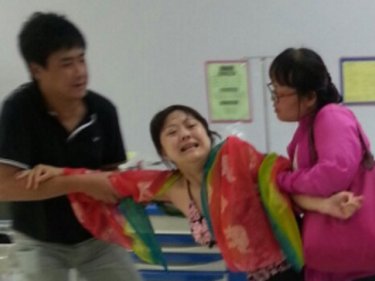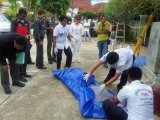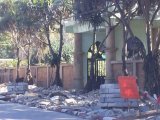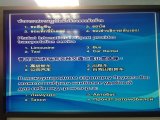A large media contingent from Phuket will accompany the governor as he meets with Sarit Jandee, head of Racha's Conservation Club.
Khun Sarit is likely to tell the governor what's already become well known to parts of the media and to China's envoys:
the guides and the speedboat crews who take the tourists to Racha are more interested in making money than looking after the safety of their passengers.
The deadliest hour of day is immediately after lunch when the tour groups are given ''free time'' on Racha island's most beautiful beach.
While the Chinese tourists are left on their own, the guides and boat boys rehire snorkels at extra commission or take a few passengers out on a thrill trip for extra money.
If you are a non-swimmer on Racha, and you are knocked over by a wave on the beach, you are in big trouble . . .
The deaths on day-trips to Racha are in addition to the unprecedented toll of more than 25 tourists and Thais who have drowned on Phuket's most famous west coast beaches so far this year.
Phuket's Lifeguard Service has improved its skills over the past three years.
But there are not enough lifeguards to patrol Phuket's long beaches and prevent people who insist on enjoying their swimming holiday from entering the surf on dangerous days.
The Phuket Lifeguard Service does not extend to Racha island. And sadly, most of the tour guides and the boat crews do not consider supervising the safety of swimmers as part of their role.
Besides, they have money to make. People who can barely swim are hired surfboards for which the guides each receive 50 baht commission, Khun Sarit told Phuketwan in July.
Back then, there had only been four drownings so far in 2013. The toll has risen since then, and it will continue to rise.
There were never any warnings about dangerous undercurrents capable of pulling non-swimming tourists out to sea quickly, Khun Sarit said - three months ago.
Back then, four of the Chinese who have since drowned were still alive.
Guides are kept busy making money. They are also paid 50 baht commission for each lounger hired by a day-tripper on Racha, Khun Sarit said.
It's difficult to imagine who is looking after the tourists in the water while the speedboat crews and the guides are looking after their extra income.
Other issues have also not been addressed.
''There is no expertise in revival techniques and no clinic nearby on Racha,'' Khun Sarit told a meeting, back in July. ''There is no capacity to react.''
The crews on the speedboats and the guides were no more able to save lives than the ''cowboy'' speedboat captains, he said.
In May, Chinese Ambassador Guan Mu warned Phuket authorities in a strong speech that the safety of Chinese tourists must be improved. The previous day, a Chinese tourist died on a snorkelling trip off Pai island.
The need for an improvement in safety in the water was repeated when Governor Maitree met with European Union Ambassadors on Phuket soon after.
Now Khun Sarit is saying yet again, as a concerned local person: ''These drownings happen too often. Tour companies show absolutely no concern for the safety of tourists.''
He added once more that the guides often pretended after a drowning that the death had been the tourist's fault, ''because they don't listen.''
''The truth is that the guides and the crews have no interest in the safety of the tourists at all,'' Khun Sarin said.
He made all the points he made in July once again on October 2, when he presented a petition to the Phuket administration at Phuket Provincial Hall in Phuket City.
He is likely to make the same points again to Governor Maitree in person on Racha tomorrow, with the Phuket and international media looking on.


















What did ever happen to the helicopter medi vac service that was going to operate from Racha to the main land?
Posted by RobinS on October 11, 2013 22:31